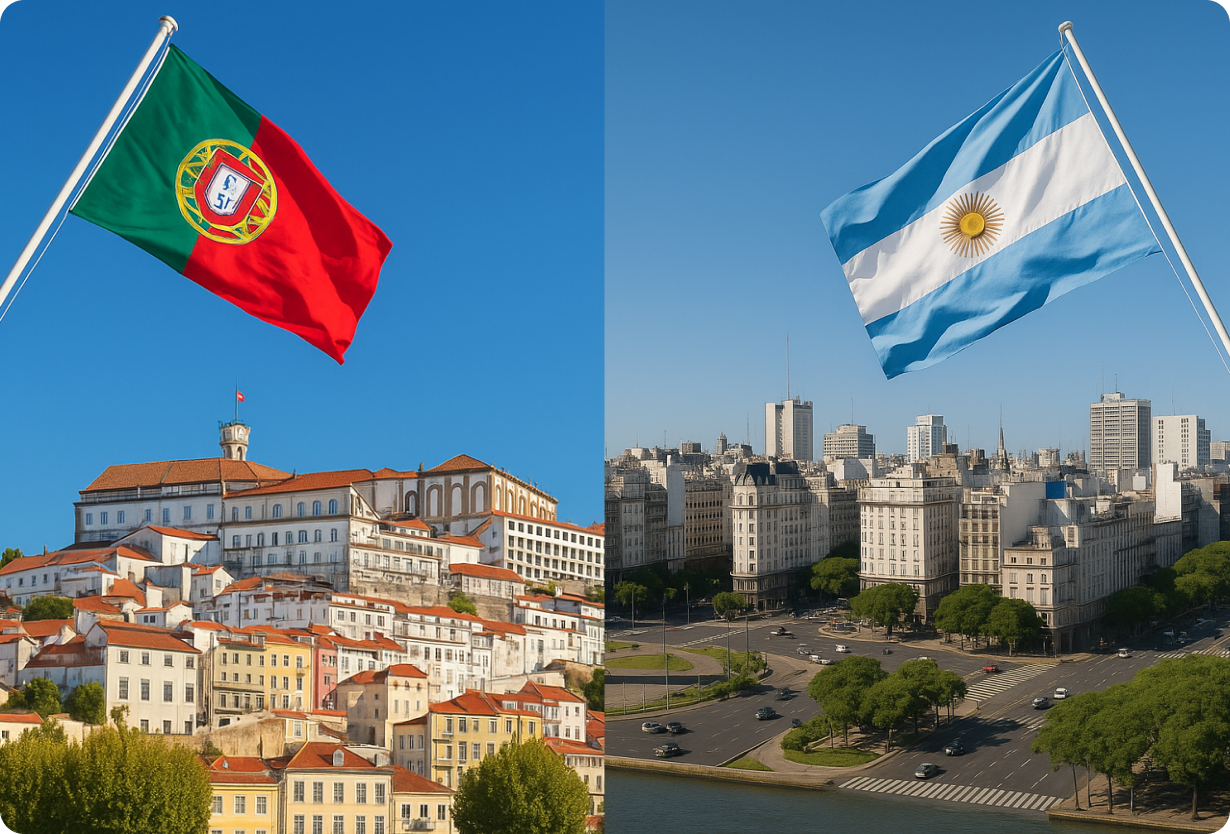
Most global mobility discussions focus on two patterns: traditional immigration (one-way relocation) or digital nomadism (frequent moves with minimal roots). But there’s a third pattern emerging that offers unique advantages for globally mobile professionals:
I call it “living in cycles.”
This approach has transformed my understanding of home from a fixed location to a continuous, evolving concept. Here’s what this alternative path to global living entails and why it might be worth considering for your own international journey.
Beyond Digital Nomadism and Traditional Expatriation
Living in cycles represents a distinct pattern of global mobility with specific characteristics:
- Extended time frames: Spending multiple years (typically 3-5) in each location
- Full integration: Establishing legal residency, paying taxes, and participating in local systems
- Professional development: Building careers locally, often changing employers within each location
- Cultural immersion: Learning languages and adapting to local norms beyond surface level
- Community building: Developing meaningful relationships beyond expatriate circles
Unlike digital nomads who might spend weeks or months in a location, cycle-based living involves genuine rootedness. Unlike traditional immigration, it maintains openness to future international transitions.

Thinking of relocating to Portugal?
A free call with our relocation expert will give you a clear path forward – no stress, just answers.
Accumulating Experience Across Borders
With each cycle in a new country, you build upon previous experiences rather than starting fresh. This creates a compound effect where knowledge, relationships, and perspectives accumulate over time.
One of the most valuable assets of cycle-based living is the international network you develop over time. These connections become professional currency that appreciates with each move.
For instance, during my time leading teams at a global IT consulting firm, I was able to tap into relationships built during previous cycles in Argentina and Brazil. Former colleagues became business partners, talent resources, and door-openers in new markets. What begins as local networking in each country gradually transforms into a powerful global web of connections that creates opportunities impossible to cultivate from a single location.
This approach differs from both traditional one-way migration where you leave one life behind, and from digital nomadism where connections often remain surface-level.
Perspective Shifts Through Multiple Cultural Lenses
Living across different cultures fundamentally changes how you perceive the world. I experienced this firsthand with historical narratives. In Europe, I learned one version of history – that Christopher Columbus discovered the Americas. But after living in Argentina and Brazil, I gained a completely different perspective. I came to understand that he didn’t discover anything – there were great empires and civilizations already there.
This shift in perspective happens naturally when you live deeply in different cultures rather than just visiting them. You begin to see how much of what we consider “objective truth” is actually shaped by cultural perspective.
Beyond historical narratives, living in cycles reshapes your understanding of cultural concepts most people take for granted. During my time in Brazil, I observed how faith functions as a societal force quite differently than in European contexts. Not necessarily in religious terms, but as a cultural framework that influences how communities approach challenges and opportunities.
These perspective shifts aren’t just interesting cultural observations – they become practical advantages especially in global business environments where understanding unspoken cultural assumptions can make a huge difference.
Practical Considerations for Cycle-Based Living
If this approach interests you, several practical aspects deserve consideration:
Career Development Across Borders
Building a career while changing countries requires strategic thinking. Different professions offer varying degrees of international mobility.
As your international journey progresses, certain professional capabilities become increasingly valuable. Languages and cultural adaptability emerge as currencies that appreciate rather than depreciate with each move.
The ability to authentically connect with people across cultural boundaries – switching not just between languages but between communication styles and business customs – becomes a significant advantage in multinational organizations. These aren’t skills you can simply learn in a classroom or by passing through locations in quick succession; they develop organically through the cycle-based living experience and compound with each new cycle.
Language Acquisition in Phases
Managing multiple languages becomes an interesting challenge in cycle-based living. My experience with Portuguese and Spanish is a good example.
My first contact with Portuguese was in the Azores, where the dialect is quite harsh and difficult to understand. I picked up some basic grammar and familiarity during my time there. Later, I spent a year in Lisbon, further developing my European Portuguese.
When I moved to Argentina, I found I needed to temporarily set aside Portuguese to avoid mixing it with Spanish as I was learning. It felt almost impossible to maintain both languages simultaneously as a learner. But interestingly, when I later moved to São Paulo, I discovered that my Spanish had become so deeply embedded that it no longer interfered with my Portuguese. I could reactivate my Portuguese knowledge, now adapted to Brazilian characteristics, while maintaining my Spanish.
Today, these languages coexist comfortably in my mind, each representing not just words but entire ways of thinking and expressing myself.
In some ways, as you acquire more languages from longer stays and deeper integration, you collect entirely new and different versions of yourself – one of the amazing perks that comes from living in these cycles.
If you’re considering this lifestyle, effective language acquisition becomes essential. I’ve found that immersive approaches yield far better results than academic ones. Reading local publications, watching regional television programs (not just international streaming services), and most importantly, building social connections with locals accelerates learning dramatically.
The goal isn’t perfect grammar but authentic communication. My Spanish carries distinct Argentinian expressions and cadences because it developed through genuine friendships and daily interactions rather than structured lessons. This natural approach makes language acquisition less of a chore and more a natural extension of building a life in each new place.
Family Considerations
For those with partners or children, cycle-based living adds complexity but also unique opportunities. My wife and I are expecting a child, which brings new dimensions to how we think about cycles and identity.
Many assume that raising children requires geographical stability, but cycle-based living can offer children unique developmental advantages. When thoughtfully managed, this lifestyle provides young people with multilingual fluency, cross-cultural competency, and adaptability that becomes increasingly valuable in our interconnected world.
The key is ensuring adequate time in each location for children to develop meaningful friendships and community connections. Unlike the rapid transitions of digital nomad families, the extended time frames of cycle-based living (3-5 years) allow children to put down temporary roots while building the remarkable adaptability that comes from periodic reinvention.
Planning Future Cycles
Those who embrace this lifestyle often maintain awareness of potential future chapters while fully investing in their current location. For example, my wife and I are considering Thailand as a potential next destination, while also envisioning a possible return to Italy later in life.
When contemplating your next potential cycle, consider what new dimension it might add to your global experience. Having built lives in both the Americas and Europe, Asia represents the missing piece in our family’s international puzzle.
Our current research focuses on Thailand for several compelling reasons beyond the obvious attractions of culture and climate. Practical considerations like visa accessibility, tax efficiency, cost of living, and safety form the foundation. For families, educational options become paramount – Thailand’s excellent international schools offering both English and Chinese language instruction represent a particular advantage for children’s future global opportunities.
From Experience to Innovation at Zerra
At Zerra, our understanding of these different approaches to global mobility directly informs our work. Recognizing the distinct needs of cycle-based living – as opposed to one-time relocation or digital nomadism – helps us develop more relevant solutions that account for your journey beyond your next relocation.
This lived experience of cycle-based global mobility directly informs our approach at Zerra. Rather than creating another transactional relocation service that helps with a single move and then disappears, we’re building continuous support systems for the entire global mobility journey.
By handling the unavoidable bureaucratic complexities throughout multiple international transitions, we enable people to focus on the aspects of global living that create the most value: cultural integration, relationship building, and professional development. Our solutions reflect an understanding that global mobility isn’t a one-time event but a continuous, evolving journey for many professionals and their families. Our mission is to make that journey as seamless as possible.
Is This Approach Right for You?
Living in cycles works well for people who:
- Value both stability and change
- Adapt well to new environments while building meaningful connections
- Enjoy learning languages and cultural nuances
- See professional benefit in cross-cultural experience
- Maintain curiosity about different systems and societies
The key distinction is the balance between rootedness and mobility – you’re neither permanently settled nor perpetually transient.
Perhaps the most profound impact of living in cycles is how it transforms your concept of home. Rather than identifying with a single place, you develop multiple belongings – creating a definition of home that transcends geography while honoring the significance of each place that has shaped you.

Thinking of relocating to Portugal?
A free call with our relocation expert will give you a clear path forward – no stress, just answers.





